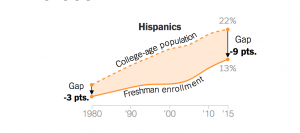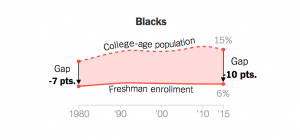If we believe that all students have equal moral worth, it is wrong that some have much better outcomes in terms of equality of opportunity: “Take two 18-year-olds with equally stellar academic abilities. One comes from the socioeconomic bottom and one from the top. That lower-income student is one-third as likely to enroll in a selective college” (Kamenetz). Poorer students are more likely to attend a lower quality school, navigate the process alone, and not have the same access to study for the SAT than their richer peers. If striving for equality is what matters and all people are equally valuable, than our system is fundamentally unethical because some groups have consistently better outcomes than others: “In 2004, rich kids were found to outnumber poor kids on selective campuses by 25 to 1” (Kahlenberg). The extremity of this number shows that poor students are essentially excluded from going to a selective school and there are unequal outcomes. While poorer students are less represented, racial minorities are as well: “The share of black freshmen at elite schools is virtually unchanged since 1980. Black students are just 6 percent of freshmen but 15 percent of college-age Americans” (Ashkenas, Park, and Pearce)

 (Ashkenas, Park and Pierce)
(Ashkenas, Park and Pierce)
Having a college degree is a key to success in society: “by 2020, 65 percent of all jobs in the economy will require postsecondary education and training beyond high school” (Carnevale). g. Currently, 33% of black adults and 23% of latinos have at least a two year degree, but over 47% of whites do (Kolodner). Since minorities have few degrees, they are less likely to find jobs. This leads to Race and socioeconomic background causing some people to have lesser outcomes than others, which is fundamentally wron